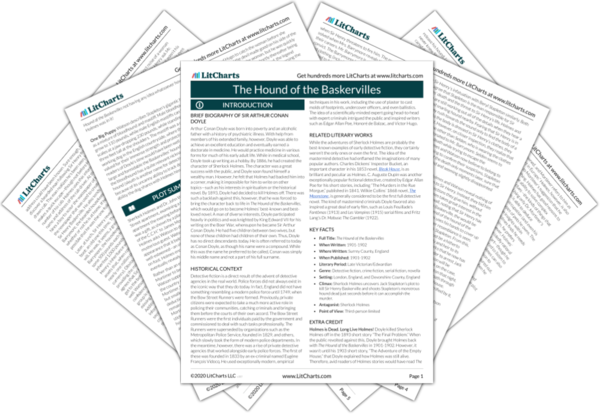The Power of Reason
Perhaps no character in the history of literature is so endowed with pure reason as is Sherlock Holmes. His fictional prowess is such that both his first and last name have been turned into adjectives (Sherlockian, Holmesian) used to describe people of unusual perceptiveness and reasoning. While Holmes is a character with a real-life inspiration—Arthur Conan Doyle’s college professor Joseph Bell—he is also a product of the optimism of Doyle’s time, which had an…
read analysis of The Power of ReasonStrong Women
Victorian society prescribed a strict role for women as “angels of the home” (indeed, “The Angel in the House” was a popular poem of the Victorian era). To be an angel of the home was to take care of that home, attend to one’s children, ensure the comfort of one’s husband…and little else. Doyle’s female characters fit this mold, but only marginally. When the situation demands it, they find themselves able to break free of…
read analysis of Strong WomenNatural vs. Supernatural
It’s impossible to discuss The Hound of the Baskervilles without engaging, in some way, with a debate between the natural world and a possibly unseen, supernatural one. The titular hound, after all, is believed to have come from Hell in pursuit of a Baskerville who sold his soul to the Devil. Furthermore, Doyle himself, both a devoted spiritualist (someone who believes that the human soul lives on after death and can be communicated with through…
read analysis of Natural vs. Supernatural
Criminal Nature vs. Criminal Nurture
Dr. Mortimer, the young man who first introduces Watson and Holmes to the Baskerville case, is a proponent of a school of quasi-medical thought known as phrenology. Phrenology is the belief that characteristics about a person can be determined through exacting measurement and observation of their skull. The central tenet of such a belief is that there exists a biological basis for all behavior that predetermines the way that one acts (as opposed to…
read analysis of Criminal Nature vs. Criminal NurtureThe Superiority of Urban Life
Baskerville Hall forms the gateway between the aristocratic, orderly world of the Baskerville family—who are far more at home in sleek, urban London—and the untamed, even dangerous world of the moor. Through this liminality, the unruliness of the moor comes to infest the tidy world of the hall with its primitive ideas about ghostly, cursed hounds and the crude greed that drives the murder plot. That is, the moor contributes nothing good to life at…
read analysis of The Superiority of Urban Life






